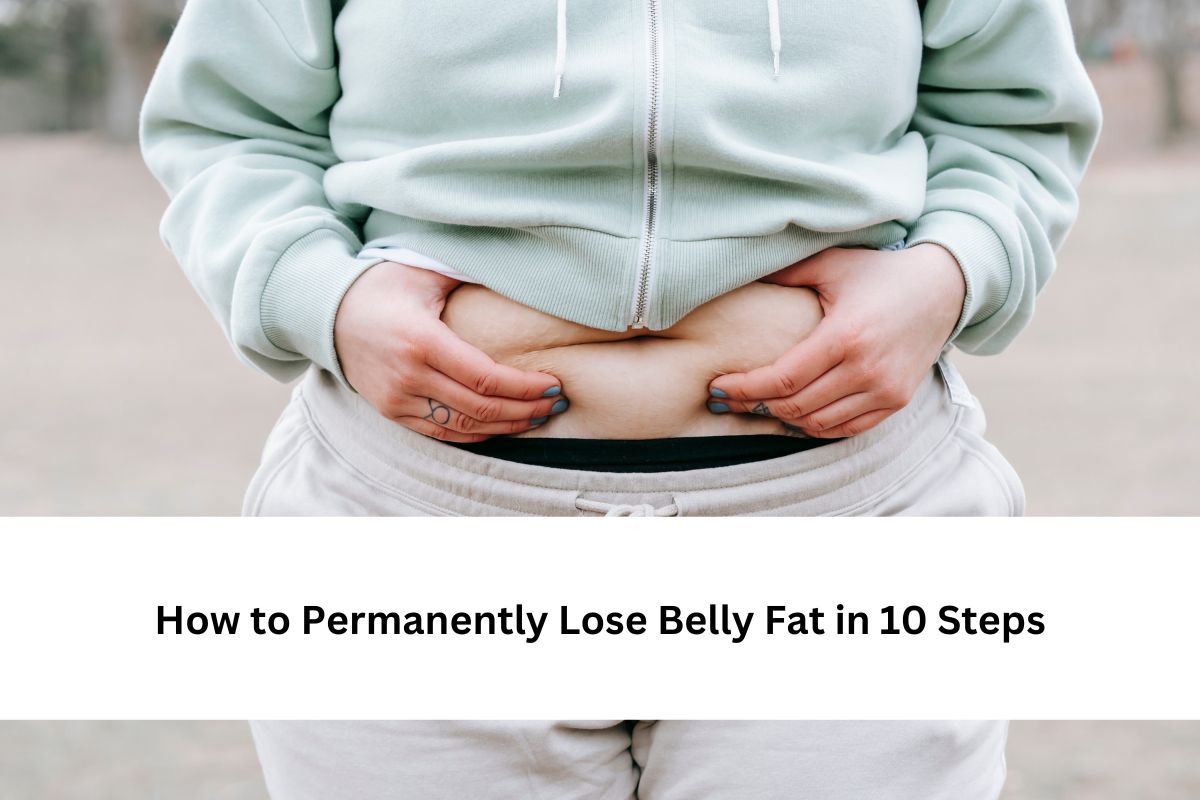Some people are quite self-conscious about how their stomach looks when they are overweight.
The increased health concerns associated with abdominal obesity, however, are seen by many psychologists as the most pressing issue.
Subcutaneous fat (fat just beneath the skin) and visceral fat (fat around the organs) both contribute to a larger waist circumference. Visceral fat is the most dangerous type of fat, yet subcutaneous fat is what most people choose to focus on.
Scientists have established that carrying extra weight around our midsection significantly raises our chances of developing metabolic illnesses like:
- Diabetes.
- Disease caused by excess fat in the liver.
- High cholesterol levels with heart disease.
- Polycystic ovarian disease.
Sleep apnea, arthritis, and several cancers are just some of the health problems that can develop when a person is overweight.
Having a waist circumference greater than 40 inches is associated with higher risk for individuals who were destined to be male at birth (AMAB). A height of 35 inches is a warning indicator for persons who were given the female gender at birth (AFAB).
Unfortunately, it takes more than just a few sessions of crunches every week to get results when it comes to decreasing belly fat.
Exercise and strength training
Cardiovascular exercises that induce perspiration are effective for reducing overall body fat, including subcutaneous fat and visceral fat. Aerobic exercise is effective for weight loss because it increases metabolic rate and fat loss, especially when combined with dietary adjustments.
Visceral fat loss appears to need a multifaceted strategy. It’s recommended that you do at least 150 minutes of cardio every week, in addition to two or three days of whole-body strength training.
Gaining muscle increases resting metabolic rate, while the metabolic boost from cardiovascular activity occurs during and immediately after the workout. As an added bonus, exercise may aid in weight loss by improving sleep quality and curbing emotional eating.
Cut back on sugary drinks and fast food
Extra pounds, especially around the middle, may result from eating too much added sugar. Drinking fruit juice or other sugar-sweetened beverages in large quantities is also problematic.
When compared to chewing, we don’t feel nearly as full or satisfied after consuming calories through beverages like soda or juice. For the same number of calories as a large glass of orange juice, you could eat three oranges and stay satisfied for far longer.
Reduce your intake of these empty calories by any means possible.
Take frequent breaks from stress.
The stress hormone cortisol is being secreted into the circulation if you are feeling stressed. Although this can cause weight gain, there is a robust correlation between elevated cortisol and increased visceral fat.
Reduce your stress levels to help you lose belly fat. relaxation techniques such as yoga, meditation, counseling, and physical exercise.
Stress increases cortisol levels, but the main problem may be that we eat less mindfully when we’re anxious. Many people use food as a means of relieving emotional distress or diverting their attention from a difficult situation in their lives.
Increase your fiber intake.
Chickpeas, lentils, and bananas are high-fiber meals that can help you feel satisfied for longer.
Soluble fiber is abundant in these meals, and it is this fiber’s ability to dissolve in water and produce a gummy gel that can impede digestion.
Increasing the amount of fiber we consume is another benefit of creating a healthy diet that emphasizes the consumption of whole grains, fruits, and vegetables.
Eating more fiber meals usually means cutting less on processed foods.

Reduce your alcohol consumption.
Heavy drinkers may be more likely to have belly fat than social or occasional drinkers, according to the study’s authors.
Alcohol has several negative effects, including lowering inhibitions and increasing calorie consumption.
Chicken wings and cheese platters are acceptable pairings with alcoholic beverages. Of course, the two go hand in hand, but when you’re distracted by one of them, you’re less likely to pay attention to your calorie intake.
If you regularly consume more than two alcoholic beverages each day, you may want to consider reducing back.
Consume a steady diet of protein.
Add some protein to your diet. Meat, seafood, eggs, dairy products, and legumes are all available.
Studies suggest that eating a meal high in protein will reduce your hunger hormone levels and help you eat less at your next meal.
More important than eating a lot of protein at once is eating enough protein throughout the day.
Ideally, your snacks would include some form of protein. When you start to feel hungry, reach for a Greek yogurt or a string cheese to curb your appetite.
Pick the good carbohydrates
Carbohydrates are often maligned unfairly. However, not all carbohydrates are unhealthy.
Complex carbohydrates, such as 100% whole grain bread, pasta, brown rice, and beans, should be eaten in place of simple carbohydrates, such as white bread, pasta, chips, and crackers, which are processed and lack fiber and can induce an increase in blood sugar.
There should still be a focus on moderation, balance, and diversity. Most people may still achieve their health goals by eating a diet rich in lean meats, plenty of vegetables, modest amounts of fruit, enough amounts of whole grains, and low-fat dairy products.
Don’t shortchange your rest.
Getting enough sleep is essential. Among its many benefits, it can strengthen the body’s defenses, lift one’s spirits, and make one more productive.
Ghrelin and leptin are two hormones that play a role in hunger regulation and can be affected by how much sleep we get.
We know that sleep deprivation and poor sleep quality might affect hunger hormones. Lack of sleep triggers a physiological reaction that increases appetite.
Seven or more hours of sleep every night is ideal. Turn off gadgets an hour before bedtime to help you wind down and try to have a regular bedtime and waking time.
Maintain a food and exercise journal.
Keeping a food diary and an activity journal has been shown to increase the likelihood of success in both areas.
Self-monitoring of diet and activity is beneficial for persons wanting to reduce weight. We can’t pinpoint a single cause, but it seems to boil down to simply being conscientious about how we treat our bodies.
If you keep a food diary, you’re more likely to make healthy choices. If you’re looking for a healthy alternative to potato chips, try some carrots.
And fitness trackers, whether a smart watch or an app, might encourage you to put on your sneakers and go for a brisk stroll.
Reduce your nighttime snacking
Admit to idly munching on snacks while marathoning your favorite TV show.
If so, you may be seeking for strategies to control your appetite in the wee hours.
Patients who effectively manage their weight by restricting the hours they eat during the day do so despite the fact that there isn’t any research suggesting intermittent fasting is superior than other weight reduction treatments.
If you want to lose weight, you may, for instance, fast for 16 hours (usually overnight) and then consume all of your daily caloric intake in only eight hours.
Having a strict eating time limit, especially at night, might be useful for certain people. Some people stop eating at around 7 o’clock at night since they know that’s when they tend to overeat and eat mindlessly.
advocate consulting a medical professional to determine the best approach to weight loss. If you’re still having trouble, consulting a trained dietician may be the best next step.
While it is true that calorie restriction and regular exercise can successfully reduce visceral fat, the specific location of weight loss is not something we can control. Improvements in BP, BG, cholesterol, mobility, and erection quality have all been linked to modest weight loss (5%-10%).
Furthermore, it is recommended that regardless of the approach taken, the individual establish a regimen, be persistent, and exercise patience.
Even if you aren’t losing a lot of weight, the positive effects of your new habits shouldn’t be forgotten. The health advantages of even the smallest of modifications can add up over time. However, this process is not instantaneous and requires patience.
FAQ’s
Q1. What belly fat-loss strategies work?
Healthy lifestyle changes help lose abdominal fat. A balanced diet of fruits, vegetables, lean meats, and whole grains helps decrease body fat, especially belly fat. Cardio and strength training enhance metabolism and promote fat reduction. Stress management, sleep, and hydration also help lose abdominal fat.
Q2. Are there belly-fat-targeting exercises?
Spot reduction is ineffective, however, abdominal muscle toning and strengthening workouts may make you seem slimmer. Planks, crunches, bicycle crunches, and leg lifts work the core. To reduce belly fat, combine these exercises with a balanced diet and full-body workouts.
Q3. How long till abdominal fat loss results?
Genetics, body composition, food, exercise program, and consistency affect how quickly effects are seen. Changes usually take weeks to months. Crash diets and intense exercise can harm health, so focus on steady, sustainable development. Maintaining belly fat loss requires patience, commitment, and a comprehensive approach.





